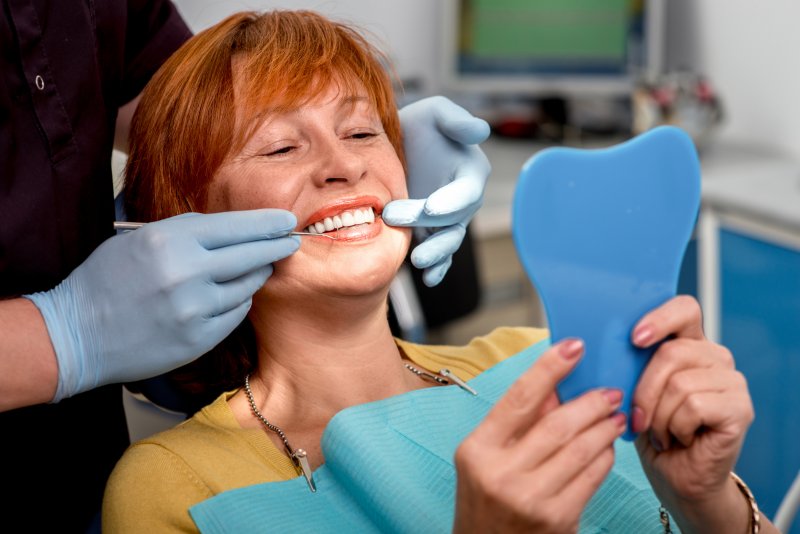September 10, 2020

Are you going thinking about making the transition from dentures to dental implants? Dentures can be life changing, especially for people who are missing most or all of their teeth. However, there are certainly some annoyances that come with them that aren’t an issue with dental implants. Implants have many benefits and are a preferred tooth replacement option by both dentists and patients alike. Continue reading to learn more from your dentist about why people make this switch and what you can expect during the transition process.
What Benefits Do Implants Have Over Dentures?
They are many reasons that people prefer dental implants over traditional dentures. Here are some of the greatest benefits that implants have:
- No Slipping: Your dental implants won’t be slipping and shifting around in your mouth or making clicking noises like ill-fitting dentures do. They are anchored into place and a successful implant will not move.
- No Trapped Food: Food won’t get trapped in your implants like they would with dentures. Just like regular teeth, food particles stuck between them can easily be removed with a good flossing technique.
- Easy Care: This means no more adhesives or soaking overnight!
- No Restrictions: You will want to be careful with hard foods, but you can eat pretty much all of your favorite foods again, even if you couldn’t have them with dentures. This is because dental implants restore up to 90% of your chewing power.
- Prevents Bone Loss: When you’re missing teeth, your jawbone isn’t being stimulated enough to stay strong. Eventually, it will begin to deteriorate leaving you with a more aged appearance and other issues. Dental implants replace the natural root of the tooth, preserving its integrity.
How Do You Care for Your New Implants?
Dental implant care works a bit differently than denture care. Here are some tips to help you get started:
- Brush Twice Daily: You can find special toothbrushes for people with dental implants. This makes it easier to clean hard to reach places.
- Floss Every Day: If not after every meal, floss at least once a day. This is important for avoiding tooth and gum damage.
- Eat Carefully: There are no food restrictions, but you should be weary of foods that are particularly hard or sticky.
- Don’t Smoke or Drink Heavily: Not only do these two things interfere with the healing process, but they also weaken the bone structure and are bad for you in general.
- See Your Dentist: Seeing your dentist for regular cleanings and checkups is crucial for maintaining optimal oral health.
Making this lifechanging switch will bring you all sorts of benefits. With proper care and maintenance, you will be loving your improved smile in no time!
About the Author
Dr. Matt VanderMolen is a well experienced dentist who has been practicing for more than three decades. He earned his Doctor of Dental Surgery from the University of Illinois before being selected for the Navy’s prestigious postgraduate program in Advanced Dentistry at Bethesda Naval Hospital. He is a Master of the American Dental Implant Association. For more information on dental implants or to schedule a consultation with Dr. VanderMolen, visit his website or call (217) 546-3333.
No Comments
No comments yet.
RSS feed for comments on this post.
Sorry, the comment form is closed at this time.
